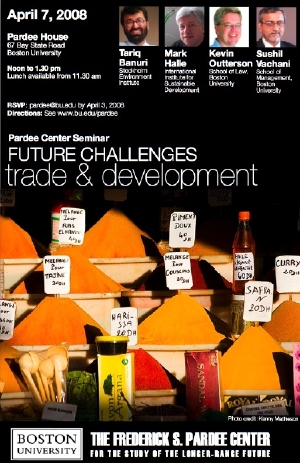Future Challenges: Trade and Development
VIDEO: Pardee Center Seminar
April 7, 2008
Inequity in the distribution of wealth both within countries and among them and the need to support local economies “at the bottom of the pyramid” were recurring themes in a conversation about trade and development at the Pardee Center’s “Future Challenges” seminar on April 7.
Thirty people participated in the second lunch time seminar in the series held in the third-floor conference room at the Pardee House. The panelists included Tariq Banuri of the Stockholm Environment Institute and chair of the board of the International Center for Trade and Sustainable Development (ICTSD); Sushil Vachani, Professor in the strategy and policy department at the BU School of Management; and Kevin Outterson, Associate Professor at the BU School of Law. Adil Najam, director of the Frederick S. Pardee Center for the Study of the Longer-Range Future and Professor of international relations, moderated the discussion.
Banuri initially raised the importance of the issue of unequal distribution of wealth as a factor influencing trade policies in the long-run. He said that when citizens are feeling an increasing divide between the rich and poor and an erosion of the middle class within their own country, they “have no stomach for international agreements,” especially any programs that they perceive as potentially harmful to their own country’s economic interests. Use inequality “as the prism through which you look at the problem and it begins to make sense,” Banuri said. “Inequality within countries and inequalities between countries both need to be addressed.”
 Vachani spoke of different models of development in local villages in India, where collaborations among government, non-government organizations and local citizens are delivering much-needed services in high-quality, low-cost fashion. He specifically spoke of one model that gives local merchants access to world markets through provision of computers with satellite links and training in how to use them.
Vachani spoke of different models of development in local villages in India, where collaborations among government, non-government organizations and local citizens are delivering much-needed services in high-quality, low-cost fashion. He specifically spoke of one model that gives local merchants access to world markets through provision of computers with satellite links and training in how to use them.
Outterson addressed concerns about the future of the World Trade Organization (WTO), characterizing it as “almost irrevocablybroken” in large part because consumer interest groups and advocates have very little voice in the process of policy development, while governments and special interest lobbyists have a very strong influence on the decisions that ultimately get made. He said that bilateral “free trade agreements” between countries have become a common mechanism for nations who don’t get what they want from WTO negotiations, but in reality those bilateral agreements often don’t really provide for free trade; they get used by a dominant country to make favorable agreements, often including policies that affect domestic issues, such as intellectual property rights provision in a recent agreement between the US and Australia.
Outterson says the WTO could be a positive force, if it can become “more democratic, more transparent and less influenced by lobbyists.” If the U.S. and other countries would “swear off the bilateral weapon” in the next round of WTO negotiations, that would help movement toward a more global consensus, he added.
A report of the event can be read here.
Run time: 1:36:43
About the Speakers
Tariq Banuri is with the Stockholm Environment Institute and chair of the board of the International Center for Trade and Sustainable Development (ICTSD); Sushil Vachani is Professor in the strategy and policy department at the BU School of Management; and Kevin Outterson is Associate Professor at the BU School of Law. Adil Najam, director of the Frederick S. Pardee Center for the Study of the Longer-Range Future and Professor of international relations, moderated the discussion.